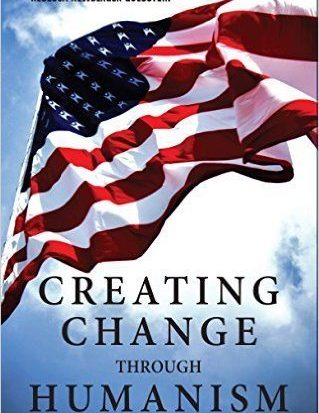
By George B. Kauffman
Roy Speckhardt, Creating Change Through Humanism, Humanist Press: Washington, DC, 2015; $18.99; ISBN 978-0- 931779-65-7 (paperback)
A 2015 Pew Research Center report reported that almost 23 percent of the American population is nonreligious. Therefore, the publication of Creating Change Through Humanism, a concise and comprehensive overview of humanism and an exploration of how nonreligious individuals lead ethical, activist lives, is especially timely.
Its author, Roy Speckhardt, Executive Director of the American Humanist Association since 2005, is a frequent media commentator who has appeared on Good Morning America, CNN Headline News, Fox News, and National Public Radio, among others. He writes a regular column for The Huffington Post and has written for On Faith (published by the Washington Post), Patheos, and other publications.
Speckhardt explains that the ideals of humanism are rooted in America’s founding, beginning with the First Amendment and the separation of church and state. He provides examples of how humanist organizations, like the American Humanist Association, are at the forefront of such pressing issues as civil rights, women’s rights, LGBTQ equality, responsible scientific freedom, and environmental and population dynamics. He also offers insights from his own personal story and those of other prominent humanists who prove that it is possible to be “good without a god.”
Speckhardt encourages his readers to be open about their atheism and to become active in social and political causes so that they can act on their positive values and combat the anti-humanism prejudice propagated by the religious right. By highlighting the achievements of individual humanists and the progress made by human and secular organizations he illustrates that a worldview relying on empathy and critical thinking is badly needed to advance progressive aims for American society.
Recently a confluence has occurred in the ideas leading people to consider the merits of science derived from human need and interest rather than from ancient texts or divine revelation. By shoving extreme beliefs in our faces, religious right leaders like Pat Robertson, and Ralph Reed during the 1990s, followed by right wing politicos like Tom DeLay, Rick Santorum, the anti-intellectual George W. Bush, creationist and design advocates like Ken Ham and Sarah Palin, and tea partiers like Rand Paul and Michelle Bachmann have galvanized us in our struggle for a more humanistic view.
Popular nontheist authors like Richard Dawkins, Sam Harris, Daniel Dennett, Ayaan Hirsi Ali, and Christopher Hitchens have written bestsellers challenging taboos about criticizing traditional religious beliefs and questioning the existence of a god. Provocative humanist and atheistic advertisement campaigns have appeared on billboards and buses. Exposure to a wider base of ideas reveals the quaintness of accepting one religion as true and believing that all others are false. Furthermore, the idea of a National Day of Reason to counter the government sponsored National day of Prayer is gaining momentum. All these factors make the introduction to humanism provided in Speckhardt’s book extremely opportune.
The book is divided into two sections, “Foundations” (6 chapters) and “Applications” (5 chapters). Chapter 1, “Is Humanism Right for Me?” presents a basic overview of humanism, while Chapter 2, “Identifying and Coming Out,” describes the humanism of three prominent humanists. Chapter 3, “An Argument for Humanism,” provides an argument for humanism, not just for those not quite sold on the concept but as a tool for people to use as they see fit. Chapter 4, “Planting the Seeds,” relates the story of humanism’s beginning and the history of the American Humanist Association. Chapter 5, “Prejudices Humanists Face,” describes the challenges that humanists face in a world resistant to change. Chapter 6, “Past and present Aspirations for a Better Future,” outlines a vision of where we are headed if we maintain our convictions and apply them effectively.
Chapter 7, “Political Consequences of Humanism,” explains that humanism is not just a knee-jerk liberal ideology but rather a considered worldview. Chapter 8, “Core Humanist Issues,” deals with several hot button issues. Chapter 9, “Living Humanism,” describes how we live our humanism, from the meaning of life and the joys that we find in it to death and thoughts about immortality. Chapter 10, “Activism,” points out the best practices for activism, charitable giving, and charitable work like addiction recovery. Chapter 11, “Conclusions Aren’t Enough,” considers how an applied humanism is essential if we are interested in creating positive change. The book concludes with four appendices — “Humanism and Its Aspirations,” “The Ten Commitments,” “Glossary of Movement Terminology,” and “Bibliography.”
I am pleased to recommend this modestly priced volume to anyone interested humanism or to progressives in general.
*****
George B. Kauffman, Ph.D., chemistry professor emeritus at California State University, Fresno, and Guggenheim Fellow, is a recipient of the American Chemical Society’s George C. Pimentel Award in Chemical Education, the Helen M. Free Award for Public Outreach and the Award for Research at an Undergraduate Institution, as well as numerous domestic and international honors. In 2002 and 2011, he was appointed a Fellow of the American Association for the Advancement of Science and the American Chemical Society.
